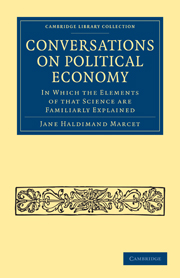Book contents
- Frontmatter
- PREFACE
- Contents
- CONVERSATION I INTRODUCTION
- CONVERSATION II INTRODUCTION—continued
- CONVERSATION III ON PROPERTY
- CONVERSATION IV PROPERTY—continued
- CONVERSATION V ON THE DIVISION OF LABOUR
- CONVERSATION VI ON CAPITAL
- CONVERSATION VII CAPITAL—continued
- CONVERSATION VIII ON WAGES AND POPULATION
- CONVERSATION IX WAGES AND POPULATION—continued
- CONVERSATION X ON THE CONDITION OF THE POOR
- CONVERSATION XI ON REVENUE
- CONVERSATION XII REVENUE FROM LANDED PROPERTY
- CONVERSATION XIII REVENUE FROM THE CULTIVATION OF LAND
- CONVERSATION XIV REVENUE FROM CAPITAL LENT
- CONVERSATION XV ON VALUE AND PRICE
- CONVERSATION XVI ON MONEY
- CONVERSATION XVII MONEY—continued
- CONVERSATION XVIII COMMERCE
- CONVERSATION XIX ON FOREIGN TRADE
- CONVERSATION XX FOREIGN TRADE—cont.
- CONVERSATION XXI ON EXPENDITURE
- INDEX
CONVERSATION XVIII - COMMERCE
Published online by Cambridge University Press: 07 September 2011
- Frontmatter
- PREFACE
- Contents
- CONVERSATION I INTRODUCTION
- CONVERSATION II INTRODUCTION—continued
- CONVERSATION III ON PROPERTY
- CONVERSATION IV PROPERTY—continued
- CONVERSATION V ON THE DIVISION OF LABOUR
- CONVERSATION VI ON CAPITAL
- CONVERSATION VII CAPITAL—continued
- CONVERSATION VIII ON WAGES AND POPULATION
- CONVERSATION IX WAGES AND POPULATION—continued
- CONVERSATION X ON THE CONDITION OF THE POOR
- CONVERSATION XI ON REVENUE
- CONVERSATION XII REVENUE FROM LANDED PROPERTY
- CONVERSATION XIII REVENUE FROM THE CULTIVATION OF LAND
- CONVERSATION XIV REVENUE FROM CAPITAL LENT
- CONVERSATION XV ON VALUE AND PRICE
- CONVERSATION XVI ON MONEY
- CONVERSATION XVII MONEY—continued
- CONVERSATION XVIII COMMERCE
- CONVERSATION XIX ON FOREIGN TRADE
- CONVERSATION XX FOREIGN TRADE—cont.
- CONVERSATION XXI ON EXPENDITURE
- INDEX
Summary
MRS. B
WE mentioned commerce as one of the modes of employing capital to produce a revenue; but deferred investigating its effects until you had acquired some knowledge of the nature and use of money. We may now, therefore, proceed to examine in what manner commerce enriches individuals, and augments the wealth of a country.
Those who engage their capitals in commerce or trade act as agents or middle-men between the producers and the consumers of the fruits of the earth; they purchase them of the former, and sell them to the latter; and it is by the profits on the sale that capital so employed yields a revenue.
There are two distinct sets of men engaged in trade: merchants, who purchase commodities (either in a rude or a manufactured state) of those who produce them: this is called wholesale trade; and shopkeepers, who purchase goods in smaller quantities of the merchants, and distribute them to the public according to the demand: this constitutes the retail trade.
CAROLINE
Trade will no doubt bring a revenue to those who employ their capital in it; but I do not conceive how it contributes to the wealth of the country: for neither merchants nor shopkeepers produce any thing new; they add nothing to the general stock of wealth, but merely distribute that which is produced by others. It is true that mercantile men form a considerable part of the community; but if their profits are taken out of the pockets of their countrymen, they may make fortunes without enriching their country.
- Type
- Chapter
- Information
- Conversations on Political EconomyIn Which the Elements of that Science are Familiarly Explained, pp. 342 - 361Publisher: Cambridge University PressPrint publication year: 2010First published in: 1816



